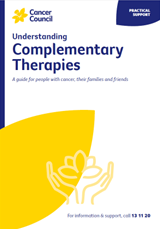- Home
- Cancer Information
- Living well
- Complementary therapies
- Making informed decisions
- Taking part in a clinical trial
Taking part in a clinical trial
Funding for clinical trials or research into the effectiveness and safety of complementary therapies is limited. Because of the popularity of complementary therapies in Australia, the NICM Health Research Institute at Western Sydney University was established to promote research in this area of health care.
Some health professionals, universities and hospitals are also involved in research and clinical trials. Your hospital or support group may provide opportunities for you to take part in clinical trials and research involving the use of complementary therapies.
Before deciding whether to join a clinical trial, discuss the questions about joining a clinical trial with the clinical trials team and your cancer specialists.
If you join a clinical trial for conventional cancer treatment, it is important to check whether using any complementary therapies could impact on the trial results. Speak to your doctor and/or the trial coordinator for information.
You may find it helpful to talk to your specialist, cancer care team or GP, or to get a second opinion. If you decide to take part in a clinical trial, you can withdraw at any time. For more information, call Cancer Council 13 11 20 or see our general section on Clinical trials and research.
To find current clinical trials near you, visit Cancer Institute NSW or Australian Cancer Trials.
I was on a clinical trial when I decided to see a naturopath, who suggested I take coconut oil. The doctor on the trial said it shouldn’t have an impact on my other medication.
Alan (Myeloma)
→ READ MORE: The role of exercise and nutrition
Meditation and Relaxation Podcast
Listen to more of our meditation and relaxation podcast for people affected by cancer
More resources
Dr David Joske, Clinical Haematologist, Sir Charles Gairdner Hospital and PathWest, Chairman and Founder Solaris Cancer Care Foundation, Clinical Professor of Medicine, The University of Western Australia, WA; Australasian Integrative Medicine Association (AIMA); Dr Robert Blum, Clinical Director, Cancer Services, Bendigo Health, NSW; Sally Brooks, Senior Pharmacist, Medicines Information, Peter MacCallum Cancer Centre, VIC; Dr Suzanne Grant, Senior Research Fellow, NICM Health Research Institute, Western Sydney University, and Chris O’Brien Lifehouse, NSW; Prof Danforn Lim, Adjunct Professor and Advisory Board Member, NICM Health Research Institute, Western Sydney University, and Adjunct Professor, UTS, NSW; Christina Line, Statewide Services Senior Coordinator, Cancer Council WA; Jen McKenzie, Physiotherapist (Lymphoedema) and ESSA Accredited Exercise Physiologist, The McKenzie Clinic, QLD; Simone Noelker, Wellness Centre and Pastoral Care Manager, Ballarat Regional Integrated Cancer Centre, VIC; Dr Nirzari Pandit, General Practitioner, RACGP Specific Interests Integrative Medicine Group, NSW; Georgie Pearson, Consumer; Cris Pirone, Counsellor, Cancer Council SA; Dr Elysia Thornton-Benko, Specialist General Practitioner, and UNSW Research Fellow, NSW; Kirsty Trebilcock, 13 11 20 Consultant, Cancer Council SA.
View the Cancer Council NSW editorial policy.
View all publications or call 13 11 20 for free printed copies.
Need to talk?
Support services
Coping with cancer?
Speak to a health professional or to someone who has been there, or find a support group or forum
Looking for transport, accommodation or home help?
Practical advice and support during and after treatment
Cancer information
Dealing with the diagnosis
Common reactions to a cancer diagnosis and how to find hope
Explore our resource hub
Explore and download our booklets, fact sheets, podcasts, webinars and videos for people affected by cancer

